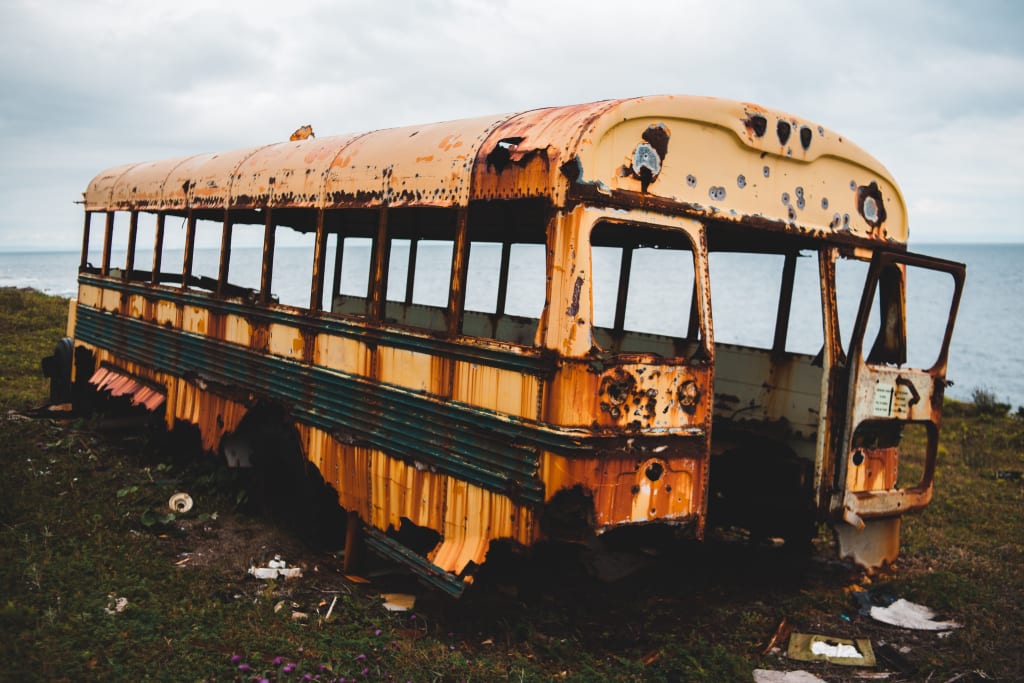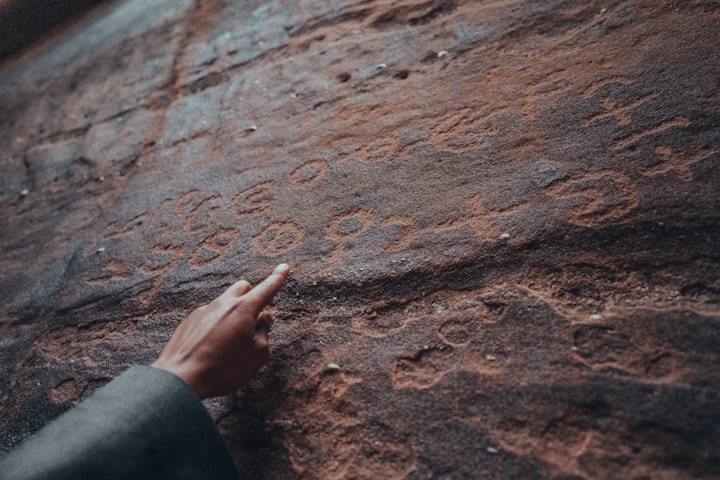The School Bus Driver's Lament
Long-time driver weeps for the death of his hometown

There’s always a first bell that sounds to signal the opening of a new school year. The kids may dread that shrill, metallic shriek, but the bus driver adored it. That ringing meant a return to normal and to the familiar, and though he was retired and had his routine during summer months, it was growing more difficult to fill his days. Getting back behind the wheel gave him solace and an outlet of productivity for however long he had left before the Grim came and took him home.
The new year was always the same, and that meant it always changed. Stops were added, others dropped. Kids grew. Kids changed. Some disappeared only for little brothers and sisters to take their place. And sometimes stops he’d made for years were crossed off his list never to be added again. Those parents’ jobs were done. The good ones. Those parents who cared. Those who had actually took an interest in raising their children. That's a good story. A story as it should be. But it was one told far too little in these times.
He welcomed the new year because he was an optimist and loved kids, but there was a lot about it that made him want to cry. Teachers get the attention and the thanks. You raise our kids, society will say in its laments on wayward parenting. Children were born to wolves but calmed by shepherds armed with dry erase markers and smiles. Good teachers are vital, but their time is limited. A year, maybe two, and the kids move on. The teacher does, too. There’s always another crew arriving, another class. The faces change each year for the teacher, but not so for the bus driver. He witnessed young people grow from near babies, tender and frightened, into young adults, bold and sure but unaware of the world at large. He liked that most about his job. He aged with them, and as he looked into the mirror and noticed more and more of the markings of time, he could see the parallel with those he ferried to and from the little place of learning he hoped they didn’t take for granted. He saw them on good days and bad. And he saw them start to drop and dwindle as age and the vices of life and lack of parenting began to take root in their soul. His route had few teens, and that wasn't because they began to drive. Very few had the money for such a luxury. They stopped riding the bus simply because they dropped out or flunked out or were arrested. Such was the way of things now.
It was morning and the bus driver was stopped at the little town’s one traffic light. Red showed on his hood and in his glasses. It was still dark, but there were a few hints of amber glowing in the east. Some children were already on board; the few older ones seated at the back, white little plastic strings carrying what they considered music to their ears. They leaned against the cold metal, some had foreheads on the glass, others were sprawled with feet on the upholstery. Kids didn’t have to share seats on his bus because there were far too few riders for such a rule. He let the kids sit where they wanted and talk as loud as they wanted. They were always quiet in the morning, but the afternoons brought rowdiness and laughs and lighthearted insults. He heard most of their talk and laughed to himself. They were kind to him, and he gave high fives to every student entering and exiting his bus. They couldn’t get on or off without returning it either. He loved his kids even though he was seeing fewer and fewer each year. Drugs and attrition, job loss, hopelessness. The same story of small towns all across America.
The light turned green and the reflection on his spectacles took on a sublime tint. The red was harsh and had hints of finality. Death. The older he got, the more he thought about what he had done with the time God had given him. How many more days would he have before his own red light didn’t switch to green? How many more days with the sounds of laughter and life and the love that only the innocent can place in your heart? Green was good. Green meant life and health. Green was a shade of optimism, and he wanted to think of the good even though the bad was desperate to intrude.
While the world had changed his hometown and was changing the kids, there were some things that remained the same. He heard an electronic sound and looked in the mirror. One of his younger riders, six-seven years old, was playing a game on a phone. She had such a bright smile he could see it in the dimness of the summer morning. It had been 25 years on the route, and he both marveled and lamented at the changes but also at how some things had stayed the same. The tools may have changed but nothing could alter the wonder of a child.
He relinquished the brake, slowly pressed the accelerator and the bus began to creep forward. He passed some cars, trucks, semis carrying goods to the local store and then down the highway, south to places with more people, more money, more future than where he called home. The interior of the bus was taking on shades of gray as the sun began its rise over the piney woods of North Louisiana. Kids entered and voices grew louder.
The next stop was a new one. The central office called the night before and told him a sheriff’s deputy placed this house on the route. A young girl named Darby was going on his list. She was nine, and a deputy’s call could only mean bad things were going on in that little one’s life. He pulled slowly to a stop and realized he once had another rider who called this place home. It had been ages since then, but now he put out the stop signs and opened the folding door once again. He remembered picking up a young girl here, but one morning she wasn't waiting for the bus. He heard she became involved with drugs and the wrong crowd, like so many others, and ruined her life. He also knew the woman who owned the house, apparently Darby's grandmother, and he knew a car crash had recently claimed her life.
The big yellow bus engine idled and spit white smoke into the humid September air. Louisiana summers are brutal. Only Florida and Texas can rival the misery that is Louisiana in the months of July, August, and September. But this morning was a cool one. A cold front came through in the night and the temperature was cold for this time of year, so he had no problem leaving the door open as he waited.
It was a modest little brick house built in the 70s. It was bought cheap as the property values in the community were at the bottom. The only people who willingly lived here were men who worked in the oil industry on and off shore, some who worked at plants in bigger cities, and the few rich people who were rich simply because their daddies were rich and their daddies before them. Others were trapped, and their situations only grew worse as the economy tanked, the jobs went overseas, and reliance on government aid went from assistance to primary income. Social security fraud was rampant, and the drug trade was booming as people did whatever they could to feed themselves and put substances in their bodies to numb their minds to the woe around them.
He wanted to weep for what his hometown had become. A cold world made colder and kids like Darby left to fight it alone. He watched the door, and remembered the story. A drunk driver t-boned Darby's grandmother in August. It was a Tuesday and the woman was on her way to a house cleaning. That’s how she made money to supplement the meager amount of disability she earned from the federal government. The driver was three times over the legal limit at 10 am and never took his foot off the accelerator as he plowed through the stop sign. The old silver Camry the woman drove flipped a half dozen times before coming to a rest in a yellowed cow pasture still wet from the morning dew. The other driver crashed through his windshield. He was driving a paint chipped dodge that still had a “Don’t blame me, I didn’t vote for the dope from hope” sticker on its bumper. He was 61 and died on impact. The woman met the Grim a couple hours later in a hospital bed.
He’d known the woman in passing. She’d been in the military. Suffered an injury that kept her from work. She was only 39 with a nine-year-old granddaughter. He always noticed how clean she kept her yard when he passed by twice a day during the school year. Now it was full of weeds.
Some cars were behind him, folk on their way to work up across the Arkansas line, and some were stopped in front, people on their way to work at the plant half an hour away. North and southbound running away from this place because this place was nothing but slow death. The school was k-12 and barely had enough kids to stay open. The last graduating class was 13 kids, and he knew the board had talked about merging it with the school a little bit bigger down at the south end of the parish. It would happen eventually and then this little village would give up its ghost.
He looked back to the house, to the door, and felt that deep despair. His positive thoughts were gone. There weren’t any lights blazing in the house or in his heart. He hoped that little girl was ok and was worried a sheriff’s deputy had gotten involved in her life. She had a momma and he knew a little bit about her, knew she had been gone a long time (not too long after she stopped riding his bus), and there was a reason little Darby was being raised by a granny in the first place. And even though he didn’t want to admit it, he knew that the little girl was probably one of the ones now being raised by wolves. She had found her shepherd, but a force of cruelty took that love away. Her story was being told time and again all across the country. Like so many others, his town was dying, and it wasn’t ever coming back.
There was a honk behind him and he realized he’d waited too long. He looked at the overgrown lawn and at the darkened windows. Twenty five years, he thought, and closed the door. He missed what his home used to be. What it had been before the drugs and laziness came in, before the corporations and outsourcing stole all the jobs, before the greed and lust and gluttony of the haves took what little was left away from the have nots. The stop signs folded and he pulled away, cars following and passing. He didn’t know who lived in that house now, but he knew at least one child did. And somehow he knew hers was just another sad story to add to the elegy for the death of his hometown.
At that moment he no longer loved his job, and he welcomed the day his red light never switched to green again.
-30-
About the Creator
Josh Walker Beavers
I teach at a small map dot on a black top in Louisiana.






Comments
There are no comments for this story
Be the first to respond and start the conversation.